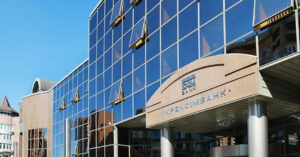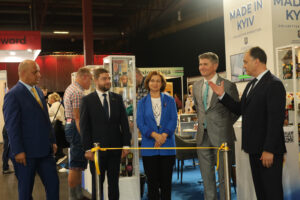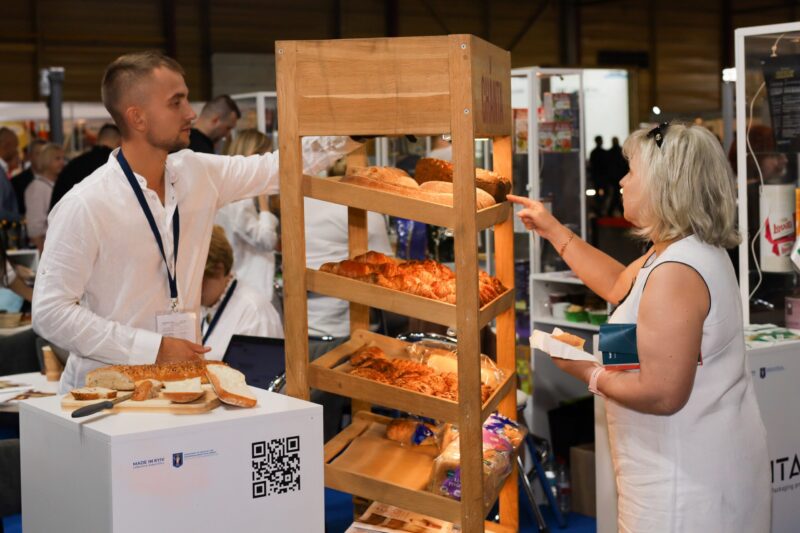
Where are businesses relocating to?
According to the Unified State Register, almost 8,000 companies relocated within Ukraine in the first eight months of 2025. In total, Ukrainian businesses moved across the country 8,345 times this year. The number of relocations has stabilized and even become lower than before the start of the full-scale war. Kyiv remains the most popular region from which and to which businesses are relocating.
This year, 8,345 business relocations from one region to another were recorded in Ukraine. This is almost the same as last year and even 10% less than in 2021. In total, 7,988 companies relocated within Ukraine during this period. It is worth noting that some businesses managed to relocate several times.
Companies operating in the trade sector are the most likely to relocate: in fact, this is every third business among all those that have moved across the country. Businesses in the construction (6%), agriculture (5%), and real estate (5%) sectors also relocate frequently.
Most businesses move to and from Kyiv. The main directions of business relocation remain routes between Kyiv and the regions. The most popular moves were from the capital to the Kyiv region (494 companies), to the Dnipropetrovsk region (379), and in the opposite direction: from the Kyiv region to the capital (378). 358 companies moved from Kyiv to the Kharkiv region, while 336 moved from the Dnipropetrovsk region to the capital.
It is worth noting that Kharkiv region is generally in the lead this year: more businesses moved to the frontline region than left it: +374 companies this year. The picture is similar in Zaporizhzhia (+276), Lviv (+161), Zakarpattia (+83), and Kyiv (+77) regions. In contrast, the capital has seen the opposite trend: 657 more companies left than arrived. Next in terms of negative balance are Dnipropetrovsk region (-102), Donetsk (-97), Volyn (-83), and Poltava (-62).
Overall, the largest number of businesses left the capital — 2,909 companies, or 36% of the total. Among other donor regions, Dnipropetrovsk (824 companies), Kyiv (770), Odesa (507), and Lviv (451) are worth noting.
At the same time, Kyiv remains the main destination for businesses relocating, with 2,252 companies choosing it as their new place of work. It is followed by Kyiv region (847), Kharkiv region (742), Dnipropetrovsk region (722), and Lviv region (613).
Three companies included in this year’s Open Data Index also managed to change their legal address. Among them is OPERCOM, a company operating in the restaurant and hotel sector, with an income of UAH 1.4 billion last year. The company moved from Kyiv to Zaporizhzhia region and is currently in the process of filing for bankruptcy.
The medical laboratory Eskulab, with revenues of UAH 942.4 million, returned to the Lviv region in February after a short stay in the capital. The insurance company ASKO DS, which had revenues of UAH 83.9 million last year, moved from the Donetsk region to Kyiv in August.
https://opendatabot.ua/analytics/business-relocation-2025





JSC OTP BANK plans to continue active lending to corporate business next year, in particular, to increase the volume of financing for renewable energy. This was stated by Alla Biniashvili, Member of the Management Board of OTP Bank responsible for corporate business development, during the event “Global Outlook: Strategic Momentum”.
“What, in our opinion, will be the driver in 2026? Of course, renewable energy. It is already financed mostly by state-owned banks, but all other institutions also prioritize financing energy security and renewable energy. And we at OTP Bank expect a significant increase in its share in our portfolio and in the portfolios of other banks next year,” said A. Biniashvili.
According to her, the banking sector is characterized by a high level of liquidity, and banks are determined to continue to finance businesses. In 2025, the top 3 lending areas include agriculture, food industry, and trade, both wholesale and retail. Financial institutions support Ukrainian companies by competing for customers and offering them optimal rates and conditions. “They do this, they successfully lend. But banks also finance companies. When we look at the balance sheets of banking institutions, we see that liabilities, i.e. deposits and account balances, are twice as high as assets. The reason for this is uncertainty: most companies are afraid to invest in projects because of the war and the risks associated with it. However, we are growing, and the banking sector is developing. If we talk about OTP Bank, we have grown by 35% in hryvnia over six months, i.e. plus UAH 6 billion to the beginning of the year,” emphasized the Board member.
According to Alla Biniashvili, despite all the challenges, including the geopolitical situation, inflation, deterioration of the trade balance due to the need for imports for energy security, lower harvests, and staff shortages, financial institutions are optimistic about the future. “We shouldn’t give up, because when the war is over, everyone will lend, and it will be a boom. And now we are working based on the situation we have and doing everything to effectively support business and the country’s economy,” emphasized the member of the Board of OTP Bank.
The event “Global Outlook: Strategic Momentum” event was attended by Andriy Pyshnyi, Governor of the National Bank of Ukraine, Olena Voloshyna, Country Manager of the International Finance Corporation (IFC) in Ukraine, and representatives of the business community. The participants focused on the following key areas: financial stability and the role of business in Ukraine’s recovery. They discussed the practical contribution of companies to rebuilding the country’s infrastructure, as well as the innovations and support needed to overcome current challenges. In total, the event was attended by about 350 guests, with another 200 joining the conference online.

The European Bank for Reconstruction and Development (EBRD) will provide a risk-sharing guarantee without pre-financing to the state-owned Ukreximbank in order to expand financing and provide new loans to Ukrainian businesses in the amount of EUR100 million.
As stated on the EBRD website, whose board of directors approved the relevant project on September 9, it will cover up to 50% of the credit risk.
According to the published information, the guarantee will be provided in two equal tranches, with the second tranche currently without obligations.
It is noted that up to EUR 20 million of sub-loans with risk sharing will be directed to finance long-term investments by SMEs under the EU4Business-EBRD Credit Line with incentives, which will allow financing long-term capital investments by SMEs to upgrade their technologies and equipment to EU standards, including investments in sustainable and green technologies (at least 70% of the sub-limit).
Eligible sub-borrowers will also receive EU-funded technical assistance and grant support in the form of investment incentives upon completion of their investment projects.
Ukreximbank is the third largest bank in Ukraine in terms of total assets as of mid-year – UAH 318.6 billion (8.3% of the system’s total assets).

The European Bank for Reconstruction and Development (EBRD) is providing a risk-sharing guarantee without upfront financing to Raiffeisen Bank to expand financing and provide new loans to Ukrainian businesses in the amount of EUR200 million. The relevant agreement was signed in London on September 9.
“The EBRD instrument will cover up to 50% of Raiffeisen Bank’s credit risk under new financing agreements for businesses operating in Ukraine. Under this mechanism, the bank will provide sub-loans to companies operating in critical sectors of the economy, such as agriculture, industrial production, pharmaceuticals, transport, and logistics,” the Ukrainian bank said in a press release on Wednesday.
According to the press release, this is already the fourth such risk-sharing agreement concluded by the EBRD with Raiffeisen Bank.
It is noted that 20% of the sub-loans covered by the EBRD guarantee will be provided to MSMEs for long-term investments in EU-compliant technologies and green technologies, strengthening the competitiveness of such enterprises in domestic and foreign markets.
Sub-borrowers who meet the conditions will also be able to receive EU-funded technical support and investment incentives, such as grants to complete their investment projects, under the EU4Business initiative. Larger incentives will be provided to businesses and households most affected by the war (e.g., those whose assets have been destroyed, damaged, or relocated), as well as to sub-borrowers that promote the reintegration of war veterans, people with special needs, internally displaced persons, and/or enterprises located in areas most severely affected by the war.
The EBRD guarantee will be supported by partial coverage of first-loss risk received from France and the EU under the Ukraine Investment Framework.
Since the start of the full-scale Russian-Ukrainian war, the EBRD has enabled more than EUR 3 billion in financing to Ukrainian borrowers through 37 similar instruments in partnership with 12 financial institutions.
Raiffeisen Bank is the largest privately owned bank in Ukraine and the fourth largest overall, with total assets of UAH 252.23 billion (6.5% of the system’s total assets) as of mid-year.
Raiffeisen Bank was founded in 1992. According to the financial institution, 68.21% of its shares are owned by Raiffeisen Bank International AG (RBI), 30% by the EBRD, and the remaining 1.79% by minority shareholders.

From September 4 to 6, Riga hosted the leading food industry exhibition Riga FOOD 2025, where the capital was represented by the MADE IN KYIV collective stand. Over three days, 10 food and packaging manufacturers from the capital presented their products on an area of 36 m².
The grand opening of the stand was attended by Anatoliy Kutsevol, Ambassador Extraordinary and Plenipotentiary of Ukraine to Latvia, Maris Sprindžuks, Vice Mayor of Riga, Hanna Starostenko, Deputy Head of the Kyiv City State Administration, and Anatoliy Bahan, Deputy Director of the Department of Industry and Entrepreneurship Development of the Kyiv City State Administration.

The three days of the collective stand’s operation were intense and productive: the stand was visited by a large number of guests, product presentations were held, and lively negotiations and discussions on new prospects for cooperation took place.
Also, on September 5, the exhibition hosted a Business Forum on Ukrainian-Latvian Cooperation, organized by the Ukrainian Chamber of Commerce and Industry and Trade House Ukraina.
The atmosphere of the event confirmed the high level of interest in Ukrainian business and facilitated effective dialogue for the development of partnerships.

“The results of Kyiv’s participation in Riga FOOD 2025 confirm that the capital’s businesses have great export potential and are able to compete in international markets. We see a high level of interest in the products of Kyiv companies and are confident that the contacts established here will grow into lasting partnerships,” said Anatoliy Bagan, Deputy Director of the Department of Industry and Entrepreneurship Development of the Kyiv City State Administration.
The organizers of the Made in Kyiv collective stand are the Department of Industry and Entrepreneurship Development of the Kyiv City State Administration.
Interfax-Ukraine is an information partner.

Schneider Electric, a leader in digital transformation in energy management and automation, has announced the launch of the third chapter of its online School of Sustainability, a free training program designed to provide partners with the tools to become leaders in sustainability.
This chapter is dedicated to teaching businesses how to decarbonize and leverage the benefits of sustainability through electrification and digitalization. According to research, companies that fail to adapt to climate risks could lose up to 7% of their annual profits by 2035, underscoring the urgency of corporate climate action. The third section directly addresses this challenge by offering practical insights to help organizations remain resilient and profitable in a rapidly changing world.
The School of Sustainability, first launched to an external audience in 2023, offers interactive courses aimed at improving companies’ sustainability performance. The program consists of three parts and responds to the growing need for accessible, applied learning on key sustainability topics. Sections 1 and 2, which are already available, cover the basics of sustainability and the steps for building and implementing a decarbonization strategy.
Section 3 focuses on how companies can implement decarbonization through energy efficiency improvements, carbon footprint reduction, and leveraging the strategic advantages of sustainable development.
It presents individual roadmaps for key industries, including:
This section introduces practical tools and solutions that make sustainable transformation real and profitable for both businesses and their customers. It is a starting point for improving the efficiency of companies and turning sustainable development into a competitive advantage.
“I am proud to launch the new section of our School of Sustainable Development — it is an important step that brings everything together into a single, coherent system. As part of our ongoing support for partners and customers on their path to sustainability, this section will provide them with the tools and knowledge to implement sustainable development principles in their organizations and for their customers,” said Soroush Heradmand, Head of Partner Sustainability at Schneider Electric.
“As the world becomes increasingly digital and electrified, our partner ecosystem is uniquely positioned to address today’s energy challenges,” added Frederic Godemelle, Executive Vice President of Energy Management at Schneider Electric. “Every business, regardless of size, plays an important role in the energy transition. We strive to help them turn sustainability into a competitive advantage by combining environmental and economic benefits for success in a rapidly changing world.”
About Schneider Electric
Schneider’s goal is to create impact by empowering everyone to make the most of our energy and resources, enabling progress and sustainability for all. We call this Life Is On.
Our mission is to be a trusted partner in sustainability and efficiency.
We are a global leader in industrial technology, bringing global expertise in electrification, automation, and digitalization to smart industries, reliable infrastructure, future-ready data centers, intelligent buildings, and intuitive homes. Leveraging our deep industry expertise, we provide integrated, end-to-end industrial IoT solutions powered by artificial intelligence with connected products, automation, software, and services, creating digital twins to deliver profitable growth for our customers.
Our company’s main resource is our 150,000 employees and over a million partners working in more than 100 countries around the world to ensure proximity to our customers and stakeholders. We support diversity and inclusion in everything we do, guided by our meaningful goal of a sustainable future for all.
Discover the latest insights shaping sustainability, Energy 4.0, and next-generation automation at Schneider Electric Insights.